Better known as “Loopy”, Adam Fasoldt is a well-known member of the Warhammer community. You can hear him on the Masters of the Forge Podcast or check out his 26,000 points of Orks on Warhammer Community’s spotlight. When he offered us the opportunity to publish an article he wrote about painting and motivation, we jumped at the chance!
The Myth of Motivation
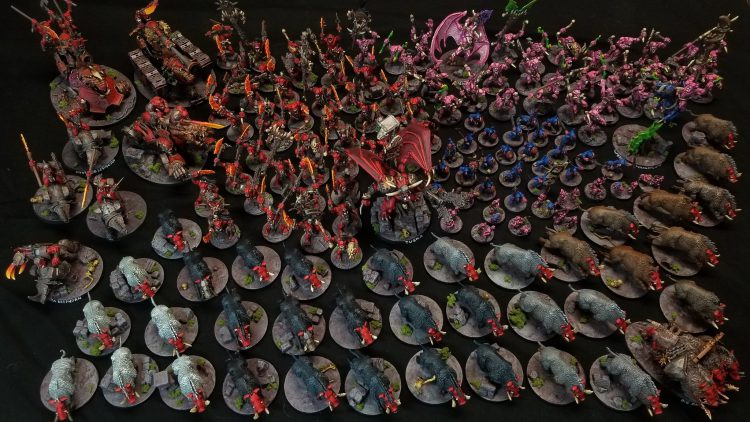
I’m proud of my hobby progress and I post it wherever I can. I’m addicted to the Good Brain Chemicals ®™ and it brings me great happiness when folks comment on my stuff and when my work finds its way on Warhammer Community Roundup. Most of the actual questions I get a lot is usually a variation on “How do you paint so fast?” I’ve got a full time job, a wife, a kid, a podcast, and I make time for friends and playing games.
Please remember that the advice below is in response to this specific question and is not intended as a panacea for all hobby ills and certainly not a directive for all hobbyists to follow. If your jam is to do your absolute best on every single model, then that shit is your jam and I am absolutely grateful to have folks like you around. Your stuff is incredible.
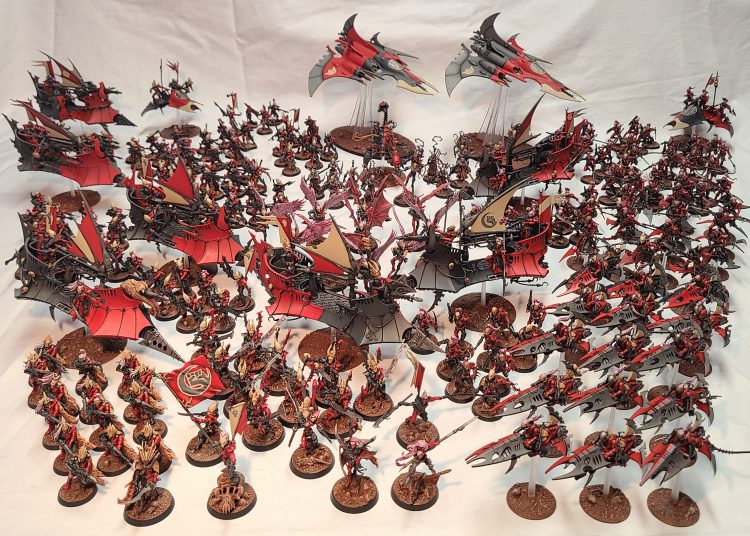
Privilege
Some of the reasons I get so much work done are due to circumstance and privilege rather than anything I’ve done that can manifest as advice.
- I may be a parent, but I’ve only got one young child. My time is not as divided as others with kids. Also, my kid is happy playing with toys himself sometimes, so sometimes we do our own thing together. We still get out and do stuff that isn’t sitting around playing, of course.
- I have very few other hobbies. I don’t really play video games and my reading is all done on audiobook. I watch very few television shows. Anything that I can multitask with painting, I do — sometimes even meetings. If you like your other hobbies, then keep engaging in them. Worry less about Warhammer.
- My only physical impediment to my hobbies is my eyesight and that is solved by taking off my glasses. I do have a family history of depression and other similar illnesses, but it is not usually an impediment to my hobby.
- I only need one job. Juggling a hobby with multiple jobs or one engrossing, high-intensity job must be very difficult and I do not envy anyone who must deal with this reality.
If you have circumstances which make it difficult to complete your projects, then you should not feel shame in this. You should, instead, manage your expectations and take great pride in the work you have done despite the challenges you face.
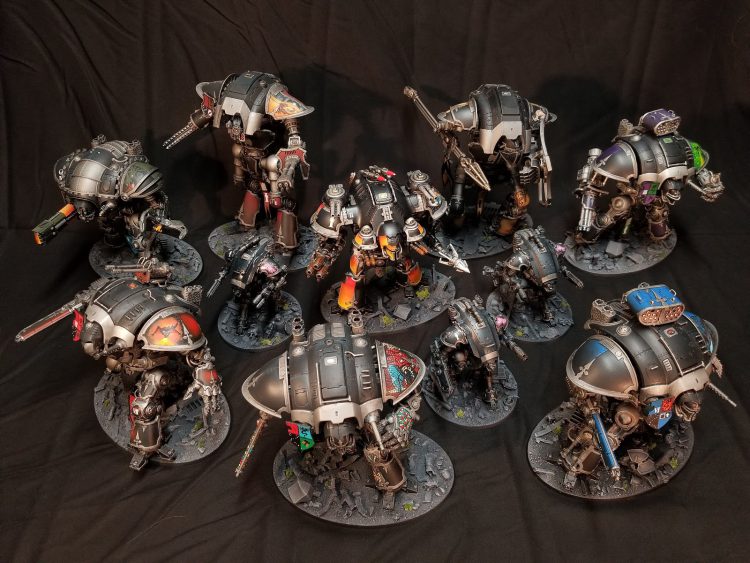
Hobby Tips
I have some simple tips for getting work done. We’ll talk about some more difficult topics after we get through these succinctly.
- I utilize clear coat as a method for “saving my game” between steps. You can usually wash away mistakes with an old brush or scrape it off with a scalloped hobby knife. Some folks are concerned about losing detail with multiple clear coat layers, but Games Workshop miniatures have very deep details and this really isn’t as much of a problem as people make it out to be. If you’re trying to get an army painted, there’s a give and take to and you must decide what is important to you.
- Most of the time, the initial color blocking (also known as basecoats) are being covered with some kind of wash. As such, if the lines between colors are a bit wiggly and jagged, you don’t have to spend hours cleaning them up. The wash is going to cover those boundaries between colors. If you aren’t doing a post-basecoat wash stage, do consider it for speeding up your process. I usually hit the base coats with a semigloss first to avoid tinting the paint when I put the wash down unless it’s a color I want to tint (like leather).
- Although it may seem like thinning your paints and waiting for the layers to dry completely makes the painting take longer, it actually saves you time because you’re not wasting strokes trying to cover and re-cover undried surfaces.
- I don’t worry about wasting paint. Sometimes I have a few pots going and/or a wet palate. Put whatever paints you are using on your palate and also paints you previously used in earlier steps. Don’t worry about whether you “waste” that swatch of paint you have on your palate. That way you can make corrections as you go instead of going back and trying to re-find mistakes you saw earlier. Paint can be expensive but what’s the point if you’re not getting any painting done?
- I use a decent single size 2 or size 3 round brush for almost all of my work. It holds a lot of paint. Just be sure to keep paint out of the roots by storing it hanging bristles-down.
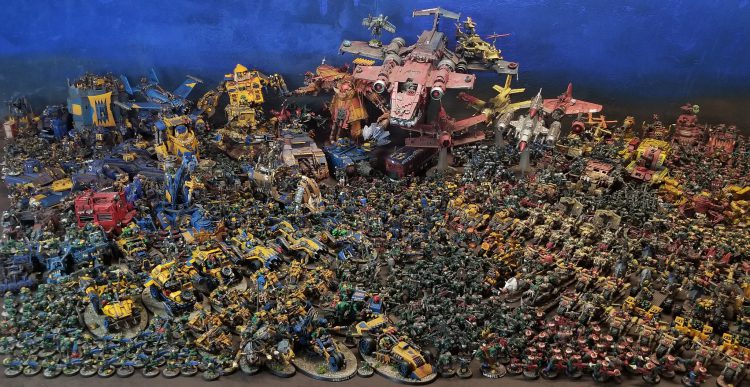
Some of my advice is difficult. It’s not hard to quantify, but to come to grips with in a positive and friendly way. I’ll share it here, though, because it’s a neutral place and not in reaction to anyone in particular, so it shouldn’t seem like an attack on anyone’s character.
The Best is the Enemy of the Good – If you haven’t seen it yet, please take note of the article, “In Praise of Mediocrity”. It makes a lot of really good points about how seeing greatness in others can color your self-respect and hamper your creativity. I’d argue this is true even when looking at your own work. Not everything needs to be perfect. Not every line has to be totally straight. If you’re trying to get an army painted and looking good on the battlefield, there’s no reason to kvetch over every highlight.
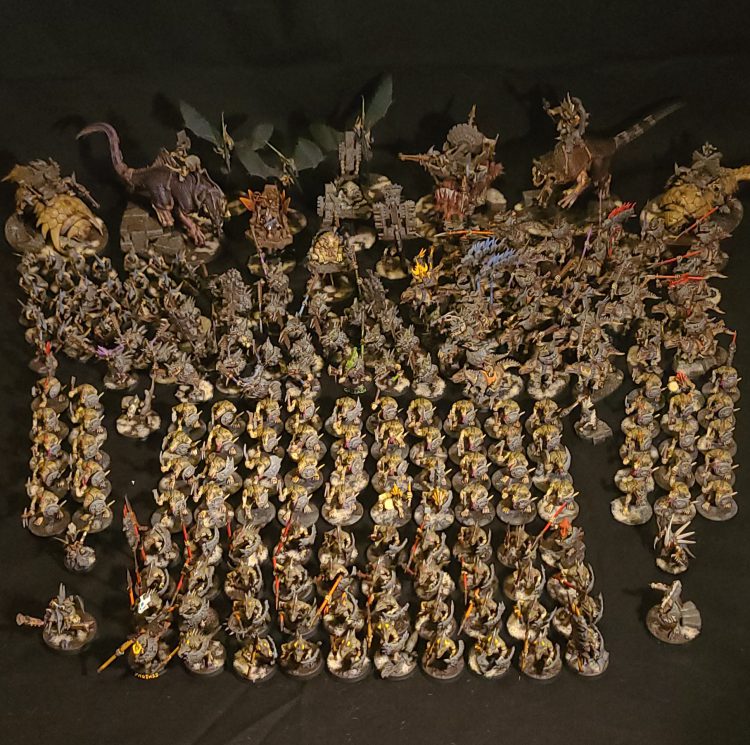
Missing highlights on parts nobody will see is not a sin. Gluing all the parts on and ignoring the areas nobody will ever see is not a sin. I haven’t edge highlighted a single model since I stopped commission painting over 5 years ago. I have yet to hear any kind of criticism about it.
Stop Waiting for Motivation – This is the big one. This is the one that I’m concerned will kind of piss you off. I swear that I’m not trying to do that, but I think this needs to be said and I might as well be the one to say it.
“It’s not supposed to be a chore,” is a mantra I hear a lot. The problem is that sometimes it is a chore. Sometimes it is not fun. Sometimes you just want to set the whole damn thing on fire. In these situations, people often give the advice “just go do something else and recharge your batteries.” But when you feel this way every time you think about painting, then you’ll never paint.
My advice is to actually just do it. Just paint. Don’t wait for motivation. Don’t wait for a sign from the gods that you are meant to be painting at that exact moment.
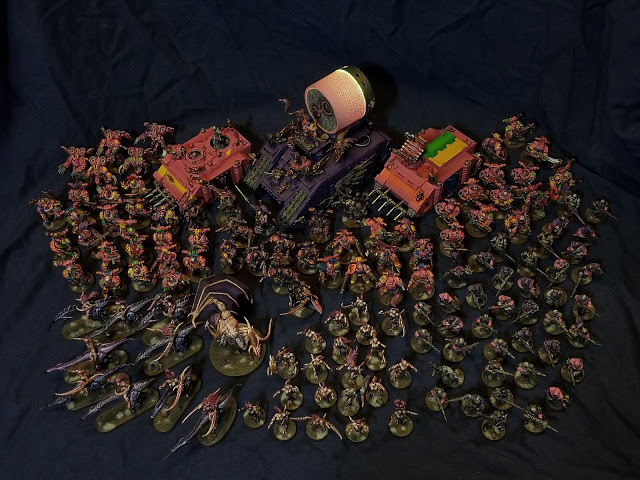
Motivation isn’t always like a bolt of lightning from an unseen external force. Sometimes you have to put forth the effort to summon it for yourself. Nobody’s going to swing by your house and grind your face into the plastic and make you do it. You’re the only person who can do that.
To be clear, I’m not advocating ruining your afternoon. With painting, a lot of the time, it’s not the doing, but the starting. Standing in your hobby area and frowning at the plastic isn’t going to get you anywhere, though. I’m not saying it’s easy, but I think you’ll be surprised the number of times you’ll start off a hobby session thinking “I hate this”, then get lost in your work for an hour or more and come out the other end of it feeling a lot better about not only your hobby, but yourself.
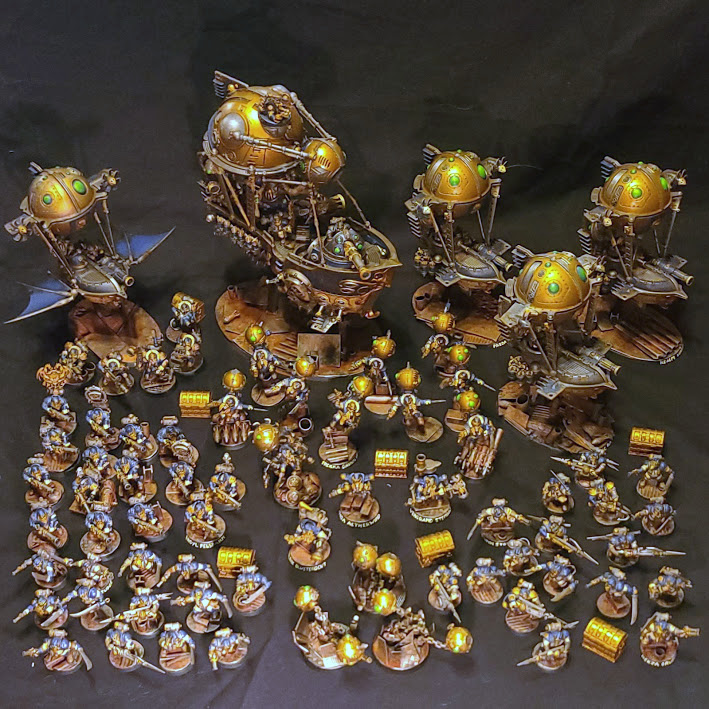
It’s Your Hobby – Again, do not lose sight of what kind of work you want to produce, the time you have to do it, and your circumstances, then manage your expectations accordingly. In any case, the cliché “practice makes perfect” is absolutely correct whether you’re going for a Golden Daemon or 40,000 points of 2nd Edition Gretchin. The more you paint, the better and faster you’ll get at it. You won’t get better or faster by giving up before you try.

